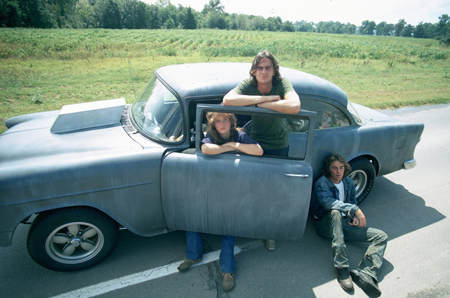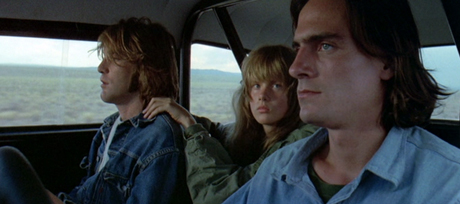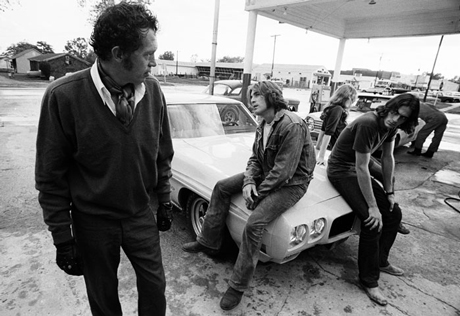
 |
|
|
|
What can you say about a former 'cult' film that now plays like an unrecognized classic? A talented early Roger Corman associate, director Monte Hellman didn't share in the early success that favored hopefuls like Peter Bogdanovich and Francis Coppola. Part of this must have been due to Hellman's serious interest in genre films. His interesting monster picture The Beast from Haunted Cave had little impact and his critically acclaimed westerns The Shooting and Ride in the Whirlwind were never properly released. Hellman's best movie Two-Lane Blacktop follows the exploits of a pair of young drifters that make their living with illegal drag races. The lean, existential road trip is an American art film without pretensions. A movie that follows the holy mantra of the Road Epic, Two-Lane Blacktop sprawls from California to the gateway to the Deep South. The Driver (James Taylor) and the Mechanic (Dennis Wilson) cruise the American Southwest in a souped-up '55 Chevy, eking out a living by challenging other hot rodders to drag races. They slip into town, locate the local car club and quickly promote a challenge. The stakes can range from eating money to the pink slips for the cars in competition. Hustling illegal races is a precarious lifestyle. There's always the danger of arrest by the cops, or violence from the racers they beat. 
In Arizona they pick up The Girl (Laurie Bird), a hippie vagrant who sleeps with most of her rides. The Mechanic takes The Girl to a motel room but it is The Driver who builds an emotional attachment to her. The trio then clashes with an even odder wanderer of the highways, GTO (Warren Oates). The loner GTO invents ridiculous personal back stories, variously claiming to be a test pilot and a secret agent. He habitually picks up hitchhikers, as if needy for a connection with humanity. GTO and the boys decide to bet pink slips to see which car can get to Washington, D.C. first. The wager complicates the formerly untroubled relationship between the racing partners: The Driver suddenly realizes he's hooked on The Girl, whose interest in both of them fades quickly. Car engines rumble and roar over the Universal logo, opening the show on a nighttime street race somewhere in the San Fernando Valley. Two-Lane Blacktop is by far the best of the early-70s 'road trip' movies that appeared in the wake of the Beverly Hills counterculture hit Easy Rider. Unfortunately, after a short theatrical run Hellman's film almost disappeared, screening only infrequently on television in terrible pan-scanned TV prints and censored to the point of incomprehensibility. Seen intact and full screen, Blacktop takes on a much broader dimension. The nomadic Driver and Mechanic are engaged in day-to-day struggles with risk and uncertainty. Their few words are almost exclusively about the Chevy's condition; nothing else seems to matter. The Mechanic keeps the car running while The Driver skillfully taunts local hot rodders into high-stakes drag races. They are the next generation of Howard Hawks rogue males, professionals that define themselves by their skills. The gambit of casting musicians as actors has paid off handsomely. Dennis Wilson (of the Beach Boys) was already a car nut and didn't need coaching to come off as authentic. The intense James Taylor (yes, the popular singer) carries the show with hardly a change of facial expression. The closest thing to a love scene occurs when Taylor attempts to teach Bird how to drive; he even relates to women through his car. As director Hellman explains, these guys don't emote, they behave. Their 'unprofessional' performances are actually quite nuanced. Hellman isn't making myths, he's showing people living myths. Warren Oates has the showcase role that corresponds to Jack Nicholson's breakout part in Easy Rider. If the younger racers are lone Ronin seeking their own path, GTO is a mass of male insecurity and overcompensation, an uptight square grasping for a sense of identity. He dresses like a member of the Rat Pack, drives a showy Pontiac muscle car and hides behind a smokescreen of tall tales. GTO is constantly mythologizing himself -- when he formally meets our racers, the three are like gunslingers sizing each other up. At the end, he even makes a legend out of his racing foes, casting himself in the leading role in yet another tall tale. GTO seems a vaguely comic character with his hitchhikers, especially a pathetic encounter with Harry Dean Stanton as a woe-begotten gay cowboy! But Hellman sees GTO as a potential soul brother to our young heroes. The partners repair GTO's car and in return he helps them set up a race. Out on the open road, whomever we meet can become a temporary friend. 
Laurie Bird is the era's most memorable hitchhiking vagabond. Her "The Girl" is neither sentimentalized nor objectified as a girl-toy. Beneath Bird's delicate appearance is a strong instinct for self-preservation. She made bit appearances in only two more films, including Annie Hall, and died tragically at age 26. With so little dialogue in Rudy Wurlitzer's script the relationships are established almost entirely with visuals. Hellman has an excellent sense of camera placement. His scenes just seem to happen, instead of being structured to showcase performances (Bob Rafelson, Five Easy Pieces) or to promote a hipster agenda (Dennis Hopper, Easy Rider). Blacktop's changing relationships fail to follow a standard dramatic pattern. Taylor's exact attraction for Bird is never spelled out but he gradually becomes more committed to her. The Girl also seems to need the Road's anonymity and independence. When any particular guy gets too close she simply changes rides. Monte Hellman eventually declares his own independence by abandoning his race-to-Washington story hook in favor of an Antonioni-like conclusion. His western The Shooting finishes as a cosmic puzzle with a pre-Kubrick 2001 ending, yet can still be interpreted along genre lines. Two-Lane Blacktop's self-conscious meltdown finale comes off as a masterstroke, even as it leaves everything about the movie unresolved. I watched carefully, but even in the higher resolution of HD could not see how much per gallon gasoline was selling for in the movie. Up until 1976 or so, Americans could burn it up by the tank-full, without a second thought. Criterion's Blu-ray of Two-Lane Blacktop replicates most of the company's 2007 DVD edition, with a new restored HD transfer from the Techniscope original. The original 2-perf Techniscope filming system was a favorite for low-budget features, as it used prime (not anamorphic) lenses to yield a 2:35 aspect ratio finished product. Each half-frame is only two perfs tall, which makes every magazine of film last twice as long, but also yields a smaller, more granular image. It's up to the skill of the lighting cameraman to obtain precise exposures and good focus. In 1970 the craft guilds knew very well how to discourage upstart alternative productions. Cameraman Gregory Sandor shot the film but union rules denied him screen credit. The same goes for Floyd Mutrux, who did a rewrite on the script but received no credit because he did not have a Writer's Guild Card. Ah, Hollywood. 
Criterion's selection of extras has been retained from the earlier disc, including two commentaries. Director Hellman responds to questions from director friend Allison Anders, remembering particulars of the road trip filming and his efforts to get unaffected performances from his actors. On a second track screenwriter Rudy Wurlitzer analyzes the movie with author and film teacher David Meyer. More interviews follow. Hellman talks to James Taylor about the experience, while Kris Kristofferson remembers being asked to use one of his songs on the soundtrack. A round table of producers also weighs in on the film and the brief period after Easy Rider when Hollywood briefly let young filmmakers loose on counterculture subject matter. We see screen tests for Laurie Bird and James Taylor as well as the film's excellent original trailer. A then & now location comparison shows how the roadside America depicted in Two-Lane Blacktop has largely disappeared. The longest extra is On the Road Again, an interview with Hellman recorded in an SUV between Coldwater Canyon and Needles, California. Hellman's daughter Melissa remembers her acting bit as a little girl going to visit a graveyard. Performance & Image is a slide show account of the restoration of one of the film's 1955 Chevy picture cars. Producer Gary Kurtz re-used two of them in American Graffiti. The insert booklet contains essays by Kent Jones and Richard Linklater. Holders of the 2007 DVD edition may want to keep it, as it contains Rudy Wurlitzer's entire published screenplay. In 1973 Sam Peckinpah called Monte Hellman the best American film director. Tom Waits' brief laudatory comment in the insert booklet carries GTO's dialogue line, "Those satisfactions are permanent." That could very well be Monte Hellman's personal motto, as his Two-Lane Blacktop is a real gem.
On a scale of Excellent, Good, Fair, and Poor,
Two-Lane Blacktop rates:
Reviews on the Savant main site have additional credits information and are often updated and annotated with reader input and graphics. Also, don't forget the 2011 Savant Wish List. T'was Ever Thus.
Review Staff | About DVD Talk | Newsletter Subscribe | Join DVD Talk Forum |
| ||||||||||||||||||